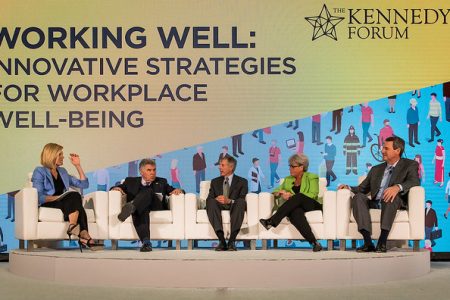On June 11, 2019, The Kennedy Forum convened advocates, major employers, HR professionals, labor leaders, and others in Chicago, Illinois to shine a spotlight on workplace well-being, and, in turn, create a better health care system for all.
The theme of the event—Working Well: Innovative Strategies in Workplace Well-Being—was chosen based on the fact that addressing employee mental health and well-being is increasingly a top priority for business leaders, especially amid rising rates of overdoses and suicides nationwide. We know that taking a proactive approach to caring for the body and the mind benefits everyone. Stress, burnout, addiction, and depression ultimately cost employers billions in productivity and healthcare-related expenses. As today’s top talent demands better access to mental health care and innovative strategies to address well-being, executives must be prepared to redefine workplace culture and showcase tangible solutions.
During the plenaries and breakout sessions of the Annual Meeting, speakers shared and explored many innovative ideas, programs, and initiatives. Below are five key takeaways that we think deserve an encore.
- Mental health and addiction have a major impact on businesses. Curious where your company stands? The National Safety Council’s Substance Use Cost Calculator provides specific information about the cost of substance use (including prescription drug use and misuse, alcohol use and misuse, opioid and heroin addiction, as well as the use of other illicit drugs and marijuana) in a workplace setting based on size of employee base, industry, and state. One Mind at Work’s Depression Cost Calculator determines the financial impact of serious depression on the employer in both direct and indirect costs, using an algorithm developed by research experts that includes averages and/or estimated values from reputable sources as well as user-supplied information.
- Employers must maximize their health care investment, demand better coverage for employees, and hold third-party administrators accountable for delivering that coverage. The National Alliance of Health Care Purchaser Coalitions’ eValue8™ program was developed to assist employers with measuring and evaluating health plan performance in areas such as mental health, oncology, and more. In 2018, National Alliance released Achieving Value in Mental Health Support: A Deep Dive Powered by eValue8™ to identify underlying gaps in the delivery of care for behavioral health and substance use disorders. Companies such as Best Buy, McMurry Cos, OPM, Prudential, and FedEx participated in an advisory capacity, helping to set a new bar for purchaser expectations and define a collective roadmap to meet those expectations
- Creating a culture where mental health is openly prioritized is essential. Johnson & Johnson created a Mental Health Diplomats Program where employees volunteer to serve as a resource for their colleagues who may be struggling with mental health concerns—connecting them to robust services offered by the company as well as other resources. The American Psychiatric Association Foundation Center for Workplace Mental Health’s Right Direction program and other resources provide employers with the tools needed to address mental health in the workplace through turnkey, customizable materials to increase awareness, reduce stigma, and motivate employees and their families to seek help when needed.
- Combating the opioid crisis will take strong investments from corporations. Leidos put forth a CEO Pledge to encourage business leaders to mobilize resources; facilitate employee education and volunteerism; focus charitable dollars; partner with nonprofit organizations; review health benefits, employee assistance programs, and prescription drug plans; and harness innovation to present new ideas and solutions.
- Unions have the power to address addiction head on. The International Union of Bricklayers and Allied Craftworkers doesn’t give up on its members struggling with substance use disorders. Over the years, they have developed a whole suite of programs to not only help prevent substance abuse, but also to identify affected workers and steer them into treatment.
For more insights from The Kennedy Forum 2019 Annual Meeting, watch our livestream here.
Join us in the fight to advance evidence-based practices, policies, and programming for the treatment of mental health and addiction! Sign up for email updates from The Kennedy Forum at the bottom or top right of this page and stay tuned for information about future campaigns, events, and initiatives.

